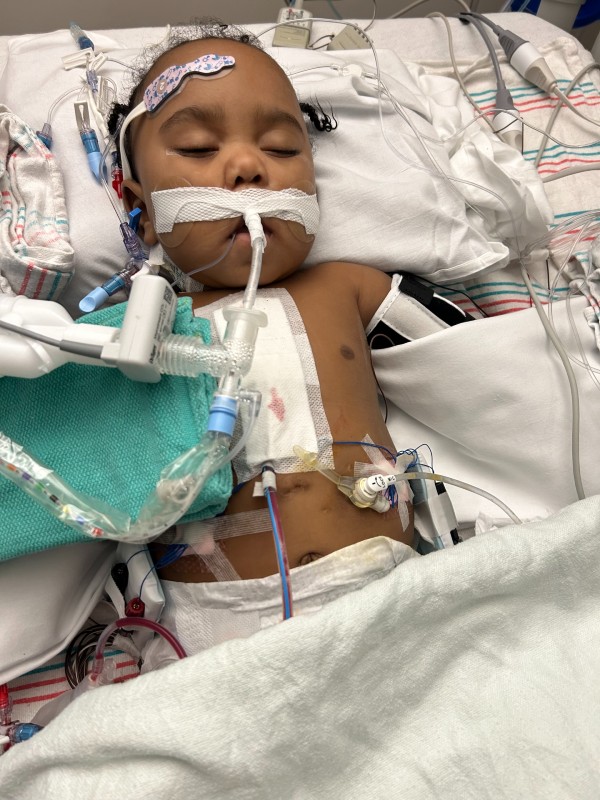 For Jameka Grace and Darryl Flowers, the path to parenthood was paved with hope, persistence, and deep longing. After enduring the emotional rollercoaster of fertility challenges and turning to IVF treatments, the couple was overjoyed when they learned they were expecting their first child.
For Jameka Grace and Darryl Flowers, the path to parenthood was paved with hope, persistence, and deep longing. After enduring the emotional rollercoaster of fertility challenges and turning to IVF treatments, the couple was overjoyed when they learned they were expecting their first child.
Their journey, however, took an unexpected and dramatic turn when, at just 22 weeks’ gestation, Jameka’s water broke prematurely. Fearing the worst, they rushed to a local Houston hospital where Jameka was admitted to the Labor & Delivery unit. The hospital’s constant care and swift action enabled Jameka to prolong her pregnancy for an additional five weeks—a critical period for the baby’s development and ultimately, his survival. Then, on December 9, 2022, Halo entered the world at 28 weeks, a tiny warrior weighing just 2 pounds, 4 ounces.
As a critically ill infant, Halo was transferred to the hospital’s Neonatal Intensive Care Unit (NICU) moments after his birth, where he was placed on breathing support and monitored around the clock. By the time he was three weeks old, his doctors had discovered an unexpected complication—a heart murmur. Upon further examination, Halo was diagnosed with not one, but two, rare and serious heart conditions.
A Double Diagnosis: Tetralogy of Fallot and Double Aortic Arch
Halo was born with Tetralogy of Fallot, a congenital heart defect characterized by four abnormalities, including a Ventricular Septal Defect (VSD), which allows oxygen-rich and oxygen-poor blood to mix through a hole between the heart's lower chambers; pulmonary stenosis, which is the narrowing of the pulmonary valve and outflow tract causing an impediment in blood flow from the right ventricle to the lungs; right ventricular hypertrophy, a thickening of the right ventricle's muscular walls, which occurs because it is pumping harder to overcome the narrowing; and an overriding aorta positioned over the VSD, which allows mixed blood into the body's main artery.
In addition, Halo had what is known as a Double Aortic Arch, a congenital anomaly where the aorta forms a ring around the trachea and esophagus, which can cause breathing or swallowing difficulties.
Both conditions require highly specialized care and advanced surgical interventions, so the local hospital recommended that Halo be transferred to the Children’s Heart Institute at Children’s Memorial Hermann Hospital, where he would have access to the level of care required for his rare conditions.
Repairing a Broken Heart
On February 2, 2023, Baby Halo was transferred to Children’s Memorial Hermann Hospital and placed under the care of affiliated pediatric cardiothoracic surgeon Dr. Christopher Greenleaf, who would perform the series of surgeries Halo needed to survive.
Not long after Halo’s arrival, when he weighed just a little more than 4 pounds, Dr. Greenleaf performed the initial repair for his Tetralogy of Fallot, which involved widening the narrowed pulmonary valve and right ventricular outflow tract for improved lung blood flow.
“We have learned over the years to tailor the operation to the individual patient,” Dr. Greenleaf said. “Sometimes it means approaching the operations in stages, but it allows us to offer care to the smallest and most premature patients and have great success.”
 A few months later, after Halo had grown stronger and continued his development outside the womb, Dr. Greenleaf performed the repair for his double aortic arch.
A few months later, after Halo had grown stronger and continued his development outside the womb, Dr. Greenleaf performed the repair for his double aortic arch.
"The surgery to correct a double aortic arch is primarily focused on alleviating the pressure exerted on the trachea and esophagus,” explained Dr. Greenleaf. “To achieve this, our affiliated surgical team carefully makes an incision, typically on the left side of the chest, to access the aortic arches. Our objective is to identify and divide the less dominant arch, effectively opening the ring that's causing the compression. This procedure helps restore typical breathing and swallowing functions, which can significantly improve the patient's quality of life.”
Halo’s first two surgeries were successful. His final repair for the Tetralogy of Fallot was scheduled for October, but it had to be delayed after Halo fell ill with RSV. But in true “Halo” fashion, the tiny warrior battled through it, and his surgery was rescheduled at Children’s Memorial Hermann Hospital for a few days after his first birthday, on December 12, 2023. The final repair completed the repair of his Tetralogy of Fallot, which included patching the VSD and relieving any residual obstruction to blood flow to the lungs.
“These surgeries could not be successful without the great diligence and care of a loving family,” Dr. Greenleaf said. “I am always in awe of how well families come together to support their loved ones. Jameka and Darryl have done an amazing job of keeping Halo healthy and progressing forward—he will do great for the rest of his life because he has a wonderful family.”
The Road Ahead
Since his last surgery, Jameka and Darryl have noticed a vast improvement in Halo’s energy and development. His vibrancy is a testament to both his own resilience as well as the remarkable medical care he received since his birth. He is actively engaging in new activities daily and he continues to show substantial health improvements.
"I cannot express enough gratitude towards Dr. Greenleaf and the team at Children’s Memorial Hermann Hospital,” Jameka said. “From the very beginning, he instilled a sense of comfort in us and a feeling that we were in the right hands. Honestly, he was the only person we trusted to take care of our baby during such a difficult time. His expertise and his genuine care went beyond our expectations—he did exactly what was needed, and the results have been incredible.”
Jameka said that by sharing Halo’s story, she hopes to offer support and encouragement to other families facing similar challenges.
"As a mother, facing my baby's rare heart conditions was an indescribably difficult journey,” Jameka said. “Every day brought its own set of fears and challenges, but the care and support we received made all the difference. To anyone going through a similar situation, I want to say, “Hold on to hope and don't let go. The road might be tough, and at times, it may seem insurmountable, but the support around you can bring light to the darkest of times.’”
Learn more about the Children’s Heart Institute at Children’s Memorial Hermann Hospital »
Contact Us
To contact Children’s Heart Institute at Children’s Memorial Hermann Hospital, please fill out the form below.
If you are experiencing a medical emergency, call 911 or go to the nearest emergency room.
If you or someone you know needs support from the Suicide and Crisis Lifeline, call or text 988.